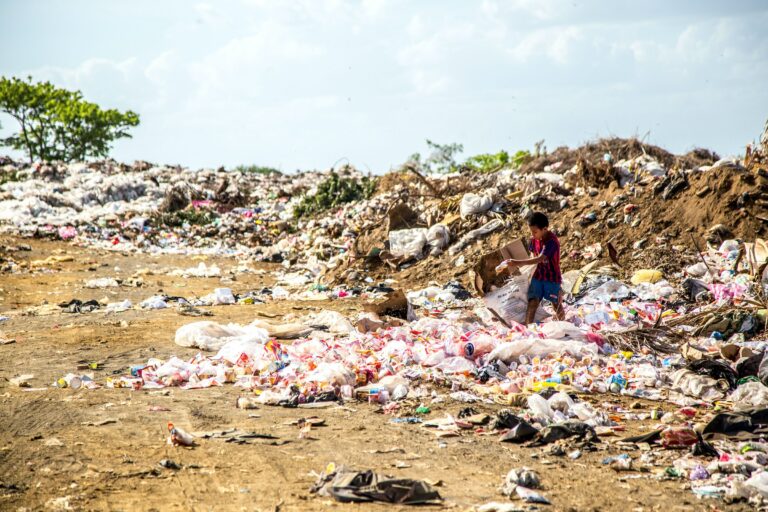The draft plastics treaty released on Monday is an important first step, but lacks sufficient clarity and ambition to fully address the climate, health, and environmental consequences of plastics, Climate Rights International said today. For the treaty to be effective, the parties must establish specific targets to reduce plastic production and pollution, and create accountability mechanisms for failure to meet those commitments.
On September 4, the United Nations Environment Program (UNEP) and the Chair of the intergovernmental negotiating committee for the Global Plastics Treaty released a “zero draft” of the treaty. This first draft provides a launching point for negotiations, which will resume in November at the third negotiating session (INC-3) in Nairobi, Kenya.
“The draft plastics treaty provides a critical opportunity for governments to negotiate a legally binding document that prevents and mitigates the climate, environmental, and human rights harms related to plastics,” said Krista Shennum, researcher at Climate Rights International. “That opportunity will be missed, however, unless the final treaty establishes a specific and timely cap on plastic production, ends the production of unnecessary virgin plastics, and eliminates the use of toxic chemicals in plastic products.”
Significantly, the current draft includes provisions that would address the lack of accessible information regarding toxic chemical additives in plastics by “requir[ing] producers and importers to disclose harmonized information on the chemical composition of all plastics and plastic products throughout their life cycle.” It also requires state parties to collect and report information about plastic produced, imported, and exported from their territories.
Increased chemical transparency is key for people to make informed decisions regarding what precautions they take to reduce toxic exposure. Currently, people have little access to information about the impacts of plastics on their rights to health, safe drinking water, and clean air.
The draft treaty calls for each party to develop and implement a national plan, similar to the process through which nationally determined contributions (NDCs) are developed by parties to the Paris Agreement on climate change. Unlike the Paris Agreement, national plans to the plastics treaty should be binding, and the treaty should also include prescriptive provisions requiring cuts to plastic production.
The draft is vague and ambiguous in key respects, Climate Rights International said. An undefined mechanism would be established to facilitate implementation and compliance with the treaty. The draft does not set minimum standards for national plans or give specific powers to the mechanism.
In addition, proposed language on waste management could provide a loophole for producers to avoid meaningful reductions in plastic production by enabling countries to prioritize recycling and other waste management practices rather than promoting actions to minimize the impacts of plastics across their lifecycle. Only nine percent of all plastics ever made have been recycled, despite decades-long campaigns by fossil fuel and petrochemical industries touting the recyclability of plastic products. The plastics crisis is far beyond a waste management issue, and the treaty should not treat it as such.
The current draft also provides language for two options regarding Extended Producer Responsibility (EPR), or the policy of extending a producer’s responsibility for a product to the end of its lifecycle. While the first option would require states to enact EPR systems, under the second option, parties are only, “encouraged to establish and operate,” EPR systems. This second option is a gift to plastic producers and would enable them to continue producing plastics with little to no accountability for the harm those products cause.
Efforts to create a Global Plastics Treaty are coming at a critical time. As global energy systems transition away from fossil fuels, major oil and gas companies are increasing investments in plastic and other petrochemical production in attempts to protect their profits and continue extracting fossil fuels. According to the International Energy Agency, petrochemicals are rapidly becoming the largest driver of global oil consumption, projected to account for roughly half of the growth in oil demand by 2050. The Global Plastics Treaty can disrupt this disastrous trend by taking a lifecycle approach to plastic pollution that addresses the full impacts of plastic production, use, and disposal on human health and the environment.
“Plastics are a growing threat to human rights and a major contributor to the climate crisis,” said Shennum. “The treaty should be strengthened and include specific and time-bound commitments to reduce and eliminate plastics production and pollution throughout their lifecycle. Coordinated global action, including a strong treaty and ambitious national plans, is needed to protect the rights of current and future generations from toxic exposure, pervasive pollution, and climate catastrophe.”
Photo Credit: A child rummages through plastic waste (CC0).







